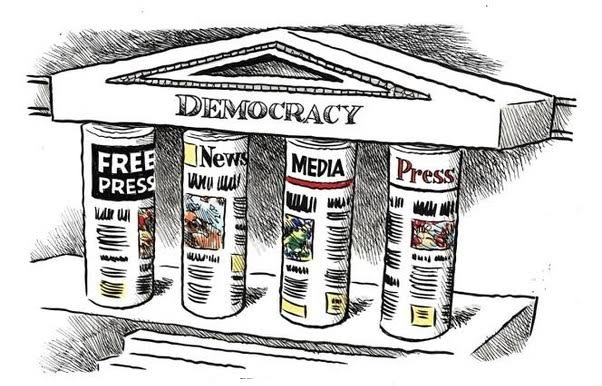MEDIA - FORTH PILLAR OF DEMOCRACY
**Author - Bhalerao Manali, a Student of Y. C. Law College, Pune
In any democratic society, the media plays a crucial role in upholding the principles of transparency, accountability, and freedom. Often referred to as the fourth pillar of democracy, the media acts as a watchdog that keeps a check on those in power and ensures that the interests and rights of citizens are protected.Through its various forms such as print, broadcast, and digital platforms, media organizations have the power to shape public opinion, hold authorities accountable for their actions, and provide a platform for diverse voices to be heard.
The role of media goes beyond mere reporting; it is also responsible for investigating societal issues, exposing corruption or injustice, and fostering an informed citizenry. By providing unbiased information and analysis on political affairs, social concerns, economic developments, and cultural trends – among others – media outlets empower individuals with knowledge necessary for making informed decisions.
Throughout history, the media has played a crucial role as the fourth pillar of democracy. Its significance lies in its ability to ensure transparency, accountability, and the dissemination of information. In democratic societies, a free and independent media acts as a watchdog, keeping the government in check and representing the voice of the people. From the early days of printed newspapers to modern digital platforms, media has been instrumental in shaping public opinion and facilitating public discourse.
In times when governments have attempted to suppress freedom of expression or manipulate public narratives, an unbiased media has acted as a vital counterforce. By providing citizens with unbiased information and multiple perspectives on issues that affect their lives, media empowers individuals to make informed decisions and hold those in power accountable.
The media plays a vital role in providing accurate and unbiased information to citizens, enabling them to make informed decisions. By disseminating news and diverse perspectives, media outlets encourage public debate and discussion on critical issues. Moreover, the media acts as a bridge between citizens and policymakers. It helps people understand government policies and actions.
The media's role as a watchdog goes beyond mere reporting; it actively challenges authorities by asking tough questions and demanding answers. By doing so, it maintains checks and balances within society, ensuring that power is not abused or concentrated in the wrong hands. Without an independent media acting as a vigilant watchdog, democracy can easily falter.
Additionally, the rise of misinformation and fake news presents a significant challenge for the media. With social media platforms becoming breeding grounds for sensationalism and propaganda, journalists struggle to verify information before disseminating it. This phenomenon not only misleads the public but also weakens faith in credible journalism. Furthermore, financial constraints pose another obstacle for media organizations.
In an era dominated by social media, the role it plays as a fourth pillar of democracy cannot be underestimated. The advent of platforms like Facebook, Twitter, and YouTube has transformed how information is disseminated and consumed, empowering individuals to engage with politics and participate in public discourse. However, this newfound power comes with inherent risks. One significant challenge posed by social media is the rampant spread of misinformation.
False narratives can swiftly go viral, misleading large sections of society and undermining democratic processes. The ease with which information is shared allows for the rapid dissemination of unverified or biased content that can sway public opinion or manipulate electoral outcomes. Moreover, social media algorithms often prioritize sensationalist or polarizing content to maximize user engagement.
However, in recent years, this vital institution has faced numerous challenges and threats that have undermined its integrity and independence. To ensure a strong future for media in democracy, it is essential to address these issues and strengthen the fourth pillar.




![Freedom of Speech in India [Indian Supreme court and Law of Sedition]](https://blogger.googleusercontent.com/img/a/AVvXsEiGLLUmLKq5Da6xDZplasOZHKRj-jOhWPkoeuy0_Eq757tUpOiHz-xooXwIlAjF0-hmBfi-TtMIv6on_sVgBXVq4wbWwnbsqLOcNX22S8C2aSq-ZuK3vn9wWAx8tXByYOBfwc0hs6b8RJV84YNFG2greouGKjup6g8kN-xVlchW33VHdSSmrhLC1BUEVbGp=w680)





